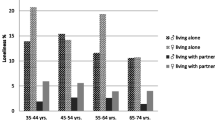Abstract
Background: Older women are at increasing risk of various forms of familial violence, yet detection is poor and very little is known of the long-term health effects of this psychosocial problem. The effectiveness of the ‘Vulnerability to Abuse’ Screening Scale (VASS) in predicting three year health outcomes was investigated among women enrolled in the Australian Longitudinal Study on Women's Health, now known as Women's Health Australia. Methods: The sample comprised a cohort of 10,421 women aged 73–78 who completed the 1996 and 1999 postal surveys (attrition rate 19.5%). The Time 2 sample had a small bias towards lower risk for elder abuse at Time 1 and better health on SF-36 and self-rated health. The VASS is a 12-item self-report measure with 4 factors: vulnerability, coercion, dependence and dejection. Results: Overall, physical health (PCS) declined while mental health (MCS) increased over the three year period. Decline in physical health was predicted by only the dejection factor, but not by factors which seem to more directly measure abuse. The predictive validity of the VASS for three year mental health outcomes was given partial support. Three of the four VASS factors (dejection, vulnerability, and coercion) predicted decline in mental health at the univariate level, however, after adjusting for confounders, only one VASS factor (dejection) independently predicted decline in mental health. Conclusions: While the VASS shows some promise as a marker of health risk in older women, only the dejection factor proved consistently predictive of declining health status. Further research is needed to determine longer term predictive validity of the scale and to gain a clearer picture of how abusive experiences impact on older women's health.
Similar content being viewed by others
References
Marshall CE, Benton D, Brazier, JM. Elder abuse: Using clinical tools to identify clues of mistreatment. Geriatrics 2000; 55(2): 42-53.
National Center on Elder Abuse (NCEA). National Elder Abuse Incidence Study (NEAIS): Final report. American Public Human Services Association, 1998. Available on the World Wide Web: http://www.aoa.dhhs.gov/abuse/report/ default.htm. Accessed 18 April 2001.
Kurrle SE, Sadler P, Lockwood K, Cameron D. Elder abuse: Prevalence, intervention, and outcomes in patients referred to four aged care assessment teams. Med J Australia 1997; 166: 119-122.
Schofield M, Reynolds R, Mishra G, et al. Vulnerability to abuse, perceived control and psychological stress among older women: Women's Health Australia study. J Appl Gerontol 2002; 21: 24-39.
Reis M, Nahmiash D. Validation of the indicators of abuse (IOA) screen. Gerontologist 1998; 38: 471-480.
Jogerst GJ, Dawson JD, Hartz AJ, et al. Community characteristics associated with elder abuse. J Am Geriatr Soc 2000; 48: 513-518.
Lachs MS, Williams C, O'Brien S, et al. The mortality of elder mistreatment. JAMA 1998; 280: 428-432.
Mouton CP, Espino DV. Problem-orientated diagnosis: Health screening in older women. Am Fam Physician 1999; 59(7): 1835-1842.
Bitondo Dyer C, Pavlik VN, et al. The high prevalence of depression and dementia in elder abuse or neglect. J Am Geriatr Soc 2000; 48: 205-208.
McFarlane J, Christoffel K, Bateman L, et al. Assessing for abuse: Self-report versus nurse interview. Public Health Nur 1991; 8: 245-250.
Gray-Vickrey P. Protecting the older adult. Nursing 2000; 30(7): 34-38, 43-45.
Schofield MJ, Mishra G. Validity of self-report screening scale for elder abuse: Women's Health Australia study. Gerontologist 2003; 43(1): 110-120.
Brown W, Bryson L, Byles J, et al. Establishment of the Australian Longitudinal Study on Women's Health. J Women's Health 1996; 5: 467-472.
Brown W, Bryson L, Byles J, et al. Women's Health Australia: Recruitment for a national longitudinal cohort study. Women's Health 1998; 28: 23-40.
Neale AV, Hwalek MA, Scott RO, et al. Validation of the Hwalek-Sengstock elder abuse screening test. J Appl Gerontol 1991; 10(4): 406-418.
Straus MA. Measuring intrafamily conflict and violence: The conflict tactics (CT) scales. J Marriage Fam 1979; 41: 75-88.
Ware JE, Kosinski M, Keller SD. SF-36 Physical and Mental Health Summary Scales: A User's Manual. Boston, Massachusetts: The Health Institute, New England Medical Center, 1994.
Mishra G, Schofield MJ. Norms for the physical and mental component summary scores of the SF-36 for young, middle and older Australian women. Qual Life Res 1998; 7: 215-220.
SAS-Institute-Inc. SAS/STAT User's Guide, Version 8, Vol. 2. Cary, North Carolina: SAS Institute Inc., 1999.
Comijs HC, Pot AM, Smit JH. Elder abuse in the community: Prevalence and consequences. J Am Geriatr Soc 1998; 46: 485-888.
Comijs HC, Penninx, BWJH, Knipscheer KPM, van Tilburg W. Psychological distress in victims of elder mistreatment: The effects of social support and coping. J Gerontol 1999; 54B(4): 240-245.
Yesavage JA, Brink TL, Rose TL, et al. Development and validation of a geriatric depression screening scale: A preliminary report. J Psychiatr Res 1983; 17: 37-49.
Author information
Authors and Affiliations
Rights and permissions
About this article
Cite this article
Schofield, M.J., Mishra, G.D. Three Year Health Outcomes Among Older Women at Risk of Elder Abuse: Women's Health Australia. Qual Life Res 13, 1043–1052 (2004). https://doi.org/10.1023/B:QURE.0000031343.15372.a5
Issue Date:
DOI: https://doi.org/10.1023/B:QURE.0000031343.15372.a5




